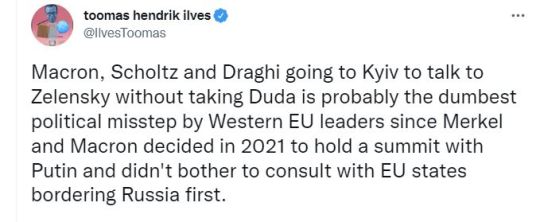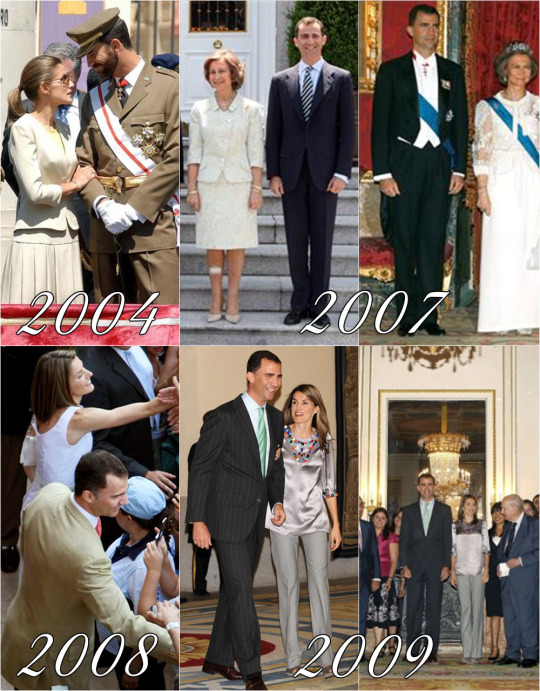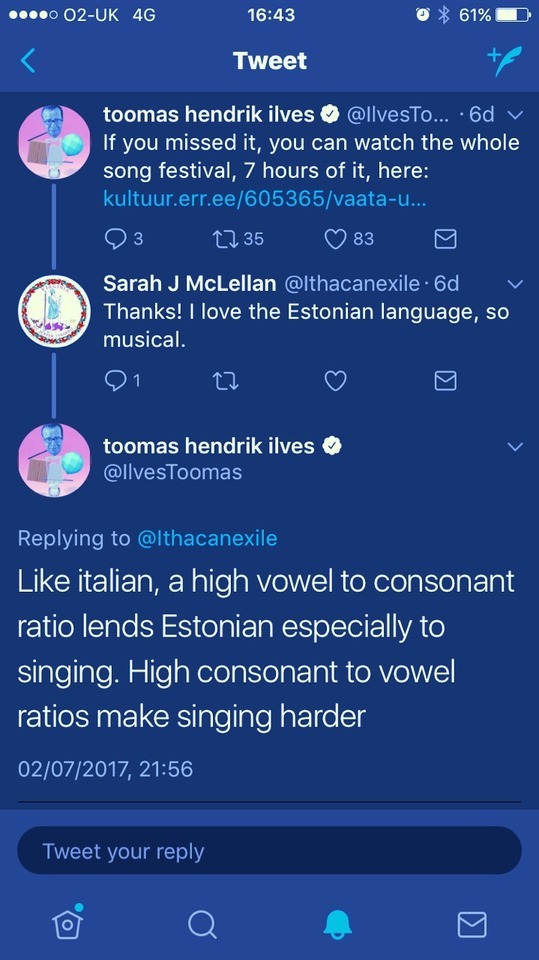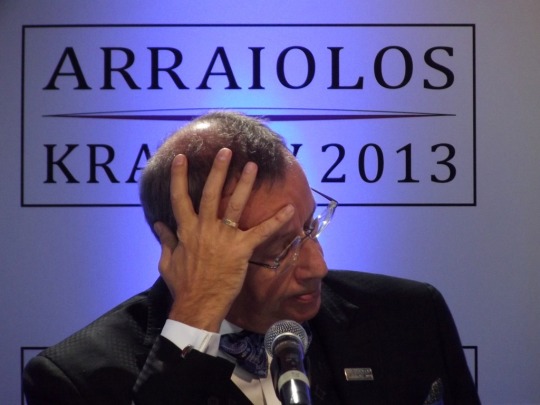#toomas hendrik ilves
Text
Much of the public discussion of Ukraine reveals a tendency to patronize that country and others that escaped Russian rule. As Toomas Ilves, a former president of Estonia, acidly observed, “When I was at university in the mid-1970s, no one referred to Germany as ‘the former Third Reich.’ And yet today, more than 30 years after the fall of the Berlin Wall, we keep on being referred to as ‘former Soviet bloc countries.’” Tropes about Ukrainian corruption abound, not without reason—but one may also legitimately ask why so many members of Congress enter the House or Senate with modest means and leave as multimillionaires, or why the children of U.S. presidents make fortunes off foreign countries, or, for that matter, why building in New York City is so infernally expensive.
The latest, richest example of Western condescension came in a report by German military intelligence that complains that although the Ukrainians are good students in their training courses, they are not following Western doctrine and, worse, are promoting officers on the basis of combat experience rather than theoretical knowledge. Similar, if less cutting, views have leaked out of the Pentagon.
Criticism by the German military of any country’s combat performance may be taken with a grain of salt. After all, the Bundeswehr has not seen serious combat in nearly eight decades. In Afghanistan, Germany was notorious for having considerably fewer than 10 percent of its thousands of in-country troops outside the wire of its forward operating bases at any time. One might further observe that when, long ago, the German army did fight wars, it, too, tended to promote experienced and successful combat leaders, as wartime armies usually do.
American complaints about the pace of Ukraine’s counteroffensive and its failure to achieve rapid breakthroughs are similarly misplaced. The Ukrainians indeed received a diverse array of tanks and armored vehicles, but they have far less mine-clearing equipment than they need. They tried doing it our way—attempting to pierce dense Russian defenses and break out into open territory—and paid a price. After 10 days they decided to take a different approach, more careful and incremental, and better suited to their own capabilities (particularly their precision long-range weapons) and the challenge they faced. That is, by historical standards, fast adaptation. By contrast, the United States Army took a good four years to develop an operational approach to counterinsurgency in Iraq that yielded success in defeating the remnants of the Baathist regime and al-Qaeda-oriented terrorists.
A besetting sin of big militaries, particularly America’s, is to think that their way is either the best way or the only way. As a result of this assumption, the United States builds inferior, mirror-image militaries in smaller allies facing insurgency or external threat. These forces tend to fail because they are unsuited to their environment or simply lack the resources that the U.S. military possesses in plenty. The Vietnamese and, later, the Afghan armies are good examples of this tendency—and Washington’s postwar bad-mouthing of its slaughtered clients, rather than critical self-examination of what it set them up for, is reprehensible.
The Ukrainians are now fighting a slow, patient war in which they are dismantling Russian artillery, ammunition depots, and command posts without weapons such as American ATACMS and German Taurus missiles that would make this sensible approach faster and more effective. They know far more about fighting Russians than anyone in any Western military knows, and they are experiencing a combat environment that no Western military has encountered since World War II. Modesty, never an American strong suit, is in order.
— Western Diplomats Need to Stop Whining About Ukraine
#eliot a. cohen#current events#politics#ukrainian politics#american politics#warfare#strategy#tactics#diplomacy#russo-ukrainian war#2022 russian invasion of ukraine#war in afghanistan#vietnam war#ukraine#usa#toomas hendrik ilves
477 notes
·
View notes
Text

Toomas Hendrik Ilves
#suitdaddy#suiteddaddy#suit and tie#suited daddy#men in suits#silverfox#suitfetish#three piece suit#waistcoat#suited men#suited grandpa#suitedman#suit daddy#suited man#buisness suit#suitedmen#Estonian man#Estonian men#Toomas Hendrik Ilves
14 notes
·
View notes
Photo

P.S. In European defense matters, this troika can be described briefly and precisely: Too late, too little, too slow. The amount of heavy long range weapons delivered to Ukraine, or rather their small volume during 108 days of war, shows that the Troika has absolutely no understanding of the scale of the invasion of the Russian orcs and the real needs of Ukraine's defense. It is quite clear that, despite the loud democratic statements, "old Europe" is ready to pursue its business interests at the expense of the security and lives of Eastern Europeans. It would be a big mistake for Eastern Europeans to rely solely on the guarantees of the "old" Europe in matters of security.
All Eastern European countries need to make significant efforts to strengthen their military industry and regional defense capabilities and military cooperation...
#Toomas Hendrik Ilves#quote#European history#Ukraine#russian invasion#political corruption#Eastern Europe
7 notes
·
View notes
Text
The most dangerous place on earth – POLITICO
The most dangerous place on earth – POLITICO
Press play to listen to this article
Strolling amid the ornate 19th-century villas, fountains and lakes that dot this sleepy spa town, it’s easy to forget that you’re standing in Vladimir Putin’s crosshairs.
Nestled on Lithuania’s southeastern border, Druskininkai opens onto a narrow notch of strategic territory known as the Suwałki Gap. Stretching about 100 kilometers along the…

View On WordPress
0 notes
Text
the idea that banning russians from receiving visas or worse, expelling russians will improve security or incite a stronger anti-war movement is so bizarre, poisonous, and dangerous. it's frankly mind-boggling to see it take greater hold in western discourse again
#the people i know who want to leave or who have left are not far from legitimate danger to their safety and well-being#toomas hendrik ilves happens to be a moron and was always a moron
491 notes
·
View notes
Photo



Felipe and Letizia retrospective: July 9th
2004: Graduation students of the Military General Academy and other officials of the Civil Guard in Zaragoza, Spain
2007: Lunch & Gala dinner offered to the president of Estonia Toomas Hendrik Ilves
2008: Visited Expo Zaragoza 2008
2009: Received the young participants in the cultural program “Ruta Quetzal BBVA 2009” and Received the participants in the 8th Balboa Program for young Ibero-American journalists at El Pardo
2010: Basic Air Academy graduation
2012: Graduation for the cadets at the Spanish Military Officer School
2013: Graduation of the Basic Air Academy
2014: Air Force Academy graduation (1, 2) & Oversaw the oath of the new Constitutional Court judge, Mr. Antonio Narváez Rodríguez
2015: Visited Telecinco TV Channel (1, 2) & Received President of the regional government of Andalusia Susana Diaz at la Zarzuela.
2016: Received US President Barack Obama at the Torrejón de Ardoz airbase
2018: Inauguration of the World Assembly of Jesuit Institutions of Higher Education in Bilbao
2019: Meeting of the Council of the Royal Board on Disability and delivered the “Queen Letizia 2018 Awards” (1, 2, 3, 4, 5, 6)
2021: Graduation of the Military General Academy in Zaragoza.
F&L Through the Years: 797/??
#King Felipe#Queen Letizia#King Felipe of Spain#Queen Letizia of Spain#King Felipe VI#King Felipe VI of Spain#F&L Through the Years#July9
7 notes
·
View notes
Text
‘Shameful’ Nicolas Sarkozy under fire for defending Putin’s Ukraine invasion | Nicolas Sarkozy | The Guardian
Responding to Sarkozy’s Ukraine remarks, Toomas Hendrik Ilves, the former Estonian president, used even less diplomatic language to describe the former French president. “After his own 2008 Georgia ‘peace plan’, which he himself scuppered a month later to restore the EU-RU cooperation agreement, he’s France’s most mendacious postwar foreign policy president. On Russia, venal as hell. Why take…
View On WordPress
0 notes
Text
MIDA SEAL HARVARDI ÜLIKOOLIS ÕPETATAKSE?
Olen kuulnud hooplemist, et TH Ilves olevat õppinud Harvardi Ülikoolis.
Ei tea, mida seal siis küll õpetatakse, kui ta ei oska mõisteid õigesti rakendada ega entsüklopeediatest järgi vaadata, mida üks või teine üldtermin tähendab?
Ilves on leiutanud uue sõna "genotsiidisõda" ja rakendab seda Venemaa invasioonile Ukrainasse.
Ilmselt ei tea või ei taha ta teada termini "genotsiid" tähendust.
Genotsiidi tunnustele vastab pigem Ukraina tegevus Donbassis alates aastast 2014.
Veel leidsin Ilvese intervjuust sellise lõigu:
'"Saame anda Ukrainale alliansiga liitumiskutse, kui liitlased on nõus ja tingimused on täidetud.' See on üleolev ainsa riigi suhtes, mis on pärast 1945. aastat pidanud sõda venelaste vastu ja seda juba üheksa aastat."
Ilmselt on Ilvesel tõsiseid raskuseid ajaloo või loogika oskamisega.
Mida head saab olla rahvuse vastu sõdimises?
Just rahvuse vastu sõdimine kaldub üle kasvama genotsiidiks.
Ja see ei vasta tõele, et Ukraina on ainus, kes pärast teist maailmasõda on Venemaa või venelastega sõdinud.
Näiteks Vietnami sõda on kohane käsitleda USA ja NSVL-i vahelise sõjana Vietnami territooriumil, aga Venemaa (sotsialistlik) kuulus NSVL-i, olles selle tuumikuks.
On selge, et TH Ilves õhutab vene rahvuse vastast vaenu, mis oma olemuselt ei erine näiteks juudi rahvuse vastase vaenu õhutamisest.
Õnneks ei saa ma seda artiklit edasi lugeda.
Aga ma mäletan, et ka presidendiks olemise ajal rääkis Ilves sageli propagandistlikke absurdsusi.
Muide, Eesti presidendi tööülesandeks on kaitsta Eesti Põhiseadust, aga rahvustevahelise vaenu õhutamine on Põhiseaduse vastane.
0 notes
Text
Time for Ukraine to Join NATO
by Andriy Yermek
Published on February 14, 2023
In April 2008, then-U.S. president George W. Bush tried to persuade Europe that Ukraine should be granted NATO membership. At a candid late-night dinner in Bucharest, Romania, Bush told European leaders that he feared the Ukrainian people would "lose faith" in the West if they were not admitted to the security alliance.
The impassioned plea led to the meal running two hours over schedule. An hour and a half after it was supposed to end, first lady Laura Bush left with the other spouses.
Yet Bush's efforts were in vain. As ever, too many other Western leaders around the table worried about "provoking" Russia, prioritizing appeasement above more noble concepts such as self-determination and international security.
Former British Prime Minister Boris Johnson recently posed the question: Where have such policies led us? Answer: to the most serious conflict in Europe since the Second World War, to mass murder, systematic rape, the destruction of civilian infrastructure, and enduring damage to the global economy.
When will my Western friends learn the lessons of history?
NATO was created in 1949 against the backdrop of the Soviet Union's nuclear testing program at Semipalatinsk in Kazakhstan. Spanning four decades and exposing an estimated 1.5 million people to nuclear radiation, the Soviet Union's grandstanding fueled an arms race that continues to rage today.
The shape of the power struggle has shifted, but the issues at its heart remain unchanged.
Following its illegal invasion of Ukraine last year, Russia blocked the adoption of a United Nations Non-Proliferation Treaty aimed to prevent the spread of nuclear weapons. Russia objected to a draft text, citing "grave concern" over its disgraceful recent activities around Ukraine's nuclear power plants.
Some European capitals need to recognize that the insanity of the Russian armed forces has the potential to threaten the very existence of several countries on their own continent. There is no point negotiating with such evil.
Over the past 20 years, the Kremlin has attempted to create the specter of Russia as a great power, rising once more from the ruins of the Soviet Union. Thankfully, the bravery of the Ukrainian forces has exposed this nonsense as a modern-day Potemkin village.
When Russia invaded, a battle for Ukraine's soul raged in and around Kyiv between February and April. Vladimir Putin's forces expected to gain control of our capital city within days — an outcome many of our allies also feared. They were not prepared for the ferocity of our resistance and the fortitude of our people.
Russia's retreat from Kyiv marked the beginning of its crumbling offensive. While the smoke and mirrors of the Kremlin's military might dissipated and cracked, Ukrainian forces took back ravaged communities in Kharkiv.
In October, the destruction of the Crimean Bridge obliterated much more than a vital supply line to Kremlin troops. It exposed the fault lines and folly of Putin's rash aggression toward Ukraine and dealt a fatal blow to decades of Russian posturing.
And at the end of the year, the recapture of the stolen city of Kherson was heralded by President Volodymyr Zelenskyy as "the beginning of the end of the war." These were moments of glory and pride for those who have given so much for our country and who have suffered unimaginable horrors at the hands of Russian war criminals.
Ukraine has proven itself on the battlefield — an issue that was often held against us as a reason for keeping us out of NATO.
Another factor often cited is our need for internal political and military reforms and guarantees of civil liberties. Former Estonian president Toomas Hendrik Ilves once likened the process of joining NATO to "a big stick rather than a big carrot" as it "forces nations to reform even when they don't want to."
Yet President Zelenskyy already has shown a willingness to confront difficult home truths. Recent weeks have shown his administration is prepared to target those who have scandalously used Putin's illegal war as an opportunity to feather their own nest, even as their compatriots die defending their homeland. Some of those arrested may have previously regarded themselves as "untouchable." The president has told Ukrainians that "there will be no return to the way things used to be."
The Kremlin's misjudgment in attacking Ukraine has betrayed its weaknesses. It has damaged its own standing in the eyes of global allies and undone its reputation as the world's second-strongest military power. Conversely, Ukraine's defiance and fightback — aided by our allies — has bolstered the resolve and strength of NATO. Our country is defeating Russia in the battle for the global mind, destroying a narrative that has endured since the Second World War.
President Zelenskyy's 10-point peace plan announced last month will, with the backing of our friends, help not only to restore sovereignty and territorial integrity within internationally recognized borders, but thwart future attempts at such aggression.
It includes the withdrawal of all Russian troops from Ukraine; the restoration of Ukraine's territorial integrity; the establishment of a special tribunal to prosecute Russian war crimes; Western security guarantees for Ukraine; guarantees of food security, including support for Ukraine's grain exports to the world's poorest nations; and guarantees on radiation and nuclear safety around Zaporizhzhia, which remains a battleground.
Ukraine's fightback against the odds and determination to drive out corruption has turned global politics on its head. Our country has not only earned its place among NATO allies, it has dismantled the myths that prevented us taking our seat at the table in the first place.
Andrii Yermak is the chief of staff to Ukraine President Volodymyr Zelenskyy.
0 notes
Text

Toomas Hendrik Ilves
#suitdaddy#suiteddaddy#suit and tie#suited daddy#daddy#men in suits#suited grandpa#suited men#suited man#suit daddy#three piece suit#suitedman#suitedmen#buisness suit#Estonian man#Estonian men#Toomas Hendrik Ilves#Toomas Ilves#Suitfetish
27 notes
·
View notes
Photo

P.S. The Kremlin's “useful fools” are still hoping to make a profit at the expense of Eastern European security. A couple of howitzer batteries and old helmets will be too little to restore the reputation of French and German politicians in Eastern Europe...
#Ukraine#russian invasion#useful fools#kremlin#political corruption#defense of europe#toomas hendrik ilves#quote
2 notes
·
View notes
Text
The Republic of Estonia and her President
The Republic of Estonia and her President
I was briefly in Tallinn, Estonia’s capital city, in early 2003. My intention was to make connections for my consulting business, which I have since put to rest. Tallinn is a short distance from Stockholm (237 miles, or 381.0 km), directly east across Östersjön (The Eastern Sea); that is, the Baltic Sea. The population of the country is around 1.3 million people (in 2002).
States around the…

View On WordPress
#Baltic States#Estonian Evangelical Lutheran Church#President of Estonia#Rotary Club of Tallinn#Soviet Union#Tallinn#Toomas Hendrik Ilves
0 notes
Photo

Estonia, where you can engage in twitter chats with the (former) President about how beautiful certain languages are for singing.
130 notes
·
View notes
Text

4 of 6 Estonian presidents (and their spouses) on the same picture. The presidents in the picture are:
Arnold Rüütel, 3rd president (1st from left)
Alar Karis, 6th president (4th from left)
Kersti Kaljulaid, 5th president (5th from left)
Toomas Hendrik Ilves, 4th president (8th from left)
38 notes
·
View notes


